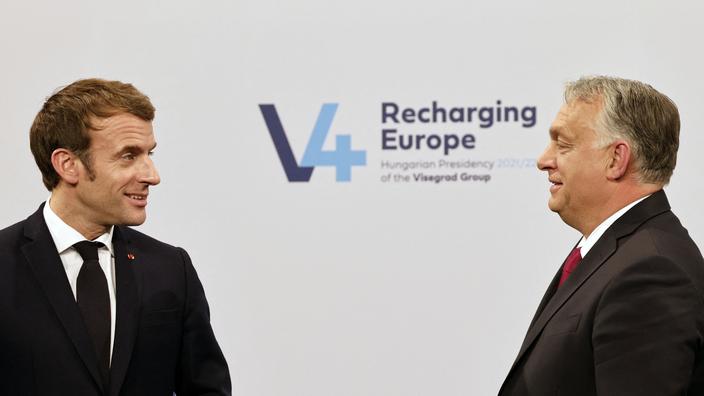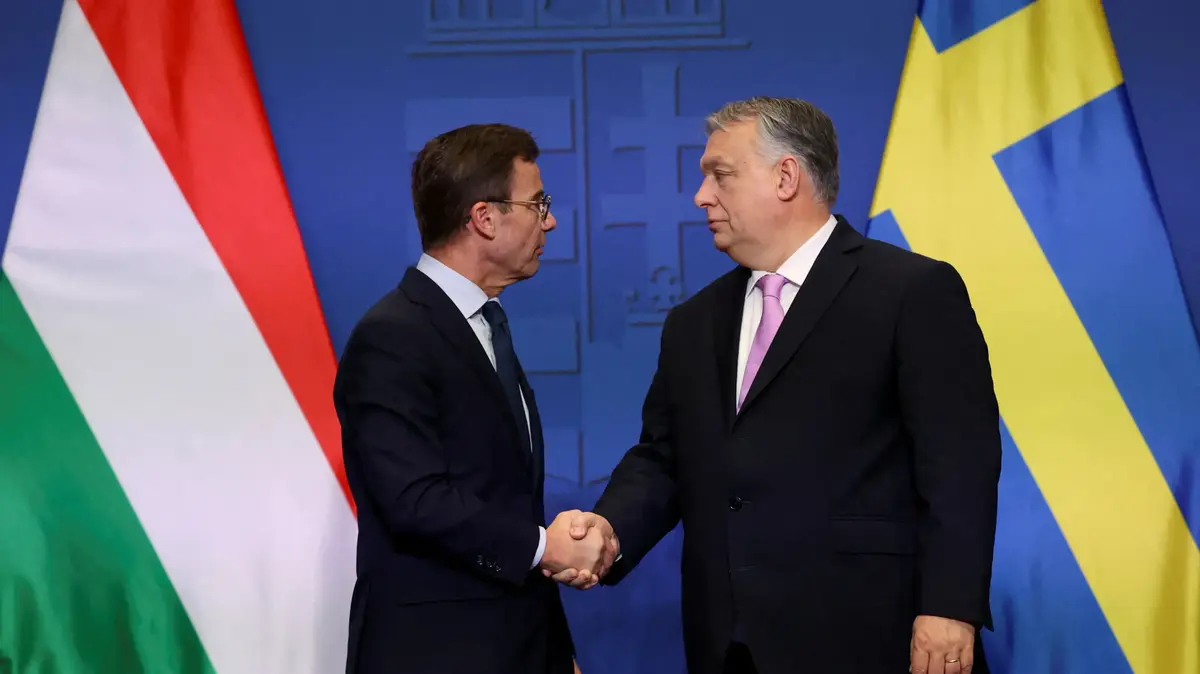A graduate in history and political science, Max-Erwann Gastineau is an essayist. He has published
The New East Trial
(Éditions du Cerf, 2019).
FIGARVOX. - Emmanuel Macron went to Hungary on Monday, December 13. What was the purpose of this meeting?
Max-Erwann GASTINEAU. -
The objective of this meeting was twofold. Building the image of candidate Emmanuel Macron for his own re-election and preparing for the French presidency of the European Union (EU), which will begin next January, the two being, of course, closely linked. Presidency placed under the sign of pragmatism: nations exist, "they are our pride", recalled Emmanuel Macron at a press conference, but must strengthen "European unity" on major strategic issues, such as the migration issue; an object on which Viktor Orbán's Hungary and, more broadly, all the States of the Visegrad group, which brings together the Hungarian but also Polish, Czech and Slovakian executives, have become essential players. Remember that in 2015, at the height of the migration crisis,the Visegrad group had derailed the automatic distribution mechanism for refugees promoted by Brussels.
Presidential candidate Macron needs concrete results on the European scene; the scene he has chosen for himself since 2017 and his great speech at La Sorbonne. If he manages to move the lines, to transcend different countries and heads of government around a common interest: the "European interest", the main ideological marker of the five-year term which is coming to an end, there is no doubt that his presidential posture will come out grown.
The disagreements with Orban will continue, because they are more philosophical than institutional or economic. But they recall that Europe is also being built from alliances of circumstance, according to a very classic conception of international relations. This may be the case with the migration file, where the issue of border protection remains unresolved. It will certainly be on the energy file, where France, faced with the new German government coalition, which includes a resolutely anti-nuclear environmental component, will need the States of Central and Eastern Europe to defend the place of its flagship industry in energy transition.
We can oblige a State to respect the clauses of the Union treaties, but we must first clearly define what comes under the common European commitment and what comes under national identities.
Max-Erwann Gastineau
On the issue of the rule of law, which is regularly the subject of a standoff between Mr. Orban and the EU, Mr. Macron contented himself with touching on the subject by promising “interesting debates”, all by invoking "the need to respect each of the Member States". Can we hope for greater respect for the peoples of central Europe to dispose of themselves?
It should be made clear from the outset that the European Union is legitimate to take an interest in questions relating to respect for the rule of law. The rule of law is one of the “values” listed in Article 2 of the EU Treaty. We cannot therefore be part of the EU and, at the same time, question a value as central as that of the rule of law.
The question is to know what we put behind this notion which, although central, remains nonetheless evolving, relative (its definition varies according to national legal traditions) and, more and more, a source of ideological instrumentalisation. , in particular within the European Parliament, where this is knowingly confused with the principle of "fight against discrimination", itself confused with the promotion of multiculturalism, questions of gender or transidentity, which strongly divide our societies, including in Western Europe.
We can oblige a State to respect the clauses of the Union treaties, but we must first clearly define what comes under the common European commitment and what comes under national identities. However, this work has not been done, and does not plan to be carried out within the framework of the French presidency of the European Union. We can regret it.
More generally, it is not a question of fighting the rule of law, but of recalling that this concept does not only contain provisions relating to individual rights, the extension of which becomes the favorite playground of “minorities”. self-proclaimed. It should be remembered that the rule of law can also contain other considerations, less individualistic than collective, relating to the protection of the general interest or of national values. The major philosophical-political orientations which prefaced the Hungarian judicial and constitutional reforms aim to take into account national cultural and spiritual specificities considered as fundamental as individual rights. These guidelines can be found in particular in a work published in 2015 by theformer constitutional judge and Minister of Justice Laszlo Trocsanyi:
National constitutions and European integration: The Hungarian example.
Book in which individual rights are considered in addition to the assertion of so-called “community” rights, based on the protection of “dear institutions”, such as the family.
Marine Le Pen went to Hungary in October. Is she the ideal ally for Viktor Orban?
If the design of Viktor Orban's ideal ally were to bear a name, it would bear that of a party: the European People's Party (EPP), which brings together in the Strasbourg Parliament the main movements of the European right, such as the CDU or LR. Because it is within the European right that Viktor Orban has long sought to influence to counter the "centralization" of the EPP, the advances of "sick liberalism" (sic), blind to the need to save landmarks (cultural ) and (national) borders.
Orphan of the EPP, Orban turns to Marine Le Pen and Marine Le Pen to Orban, for reasons of domestic policy (new competition from Eric Zemmour). But will they form a new group in the European Parliament? Difficult to answer. Fidesz (the Hungarian conservative party) talks with the group of European Conservatives and Reformists (CRE), which brings together the Polish conservatives from PiS and Spanish from Vox, and the Identity and Democracy (ID) group, which brings together MEPs from the National Assembly . Beyond their differences, these parties are increasingly united by the same objective: no longer to leave the EU, but to recompose it from within, in a logic of opposition to “Brussels centralism” (sic).
Heller saw Orban's conservative nationalism as a return to 19th-century romanticism, valuing anchorage and the particular… to the detriment of the Enlightenment spirit and European cosmopolitanism.
Max-Erwann Gastineau
The French President insisted on starting his visit with a tribute to the intellectual Agnès Heller, an opponent of Mr. Orban's regime. How could this have been perceived by Hungarian opinion and power?
Agnes Heller was known to the opposition and intellectual circles, less to Hungarian public opinion in general. Emmanuel Macron's tribute to this former figure of the liberal intelligentsia, who died in 2019, therefore had a modest echo. But the objective was elsewhere: to allow Macron to send a clear message to the opposition, a few months before the next Hungarian legislative deadlines, without adopting an overly divisive posture on topical issues, such as those relating to the LGBT cause. .
A word about the role of Agnes Heller, whose fame transcended national borders. The founder of the Budapest School called Orban a “tyrant”, but underlined a point that should hold our attention, concerning the reasons for the electoral success of the conservatives who, let us remember, won the last three legislative elections (2010, 2014 , 2018), in quite different contexts: economic and financial crisis in 2010; consolidation of the new “Hungarian model” in 2014; an open and cultural crisis with Brussels in 2018. A success which, according to Heller, was due to their ability to build a great national narrative, in a “post-utopian era”, disillusioned, marked by the absence of any great alternative. Heller saw the conservative nationalism ofOrban as a return to the romanticism of the 19th century, emphasizing the anchoring and the particular ... to the detriment of the spirit of the Enlightenment and European cosmopolitanism. A fair enough remark. The whole point is to know if, for the future of the old continent, we can still continue to oppose the universal to the particular, the European construction to the national feelings, the European unity to the civilizational framework which underlies it.European unity to the civilizational framework which underlies it.European unity to the civilizational framework which underlies it.







